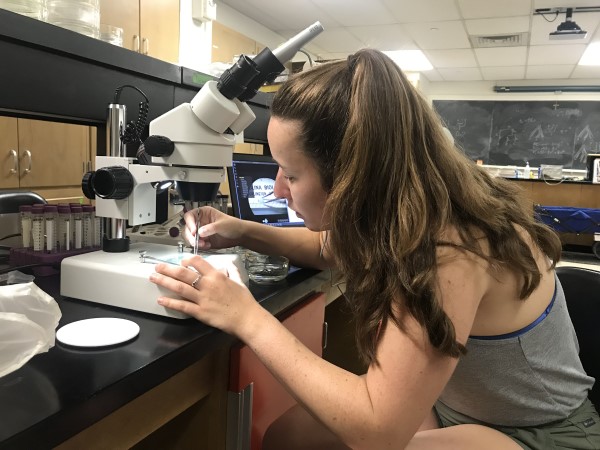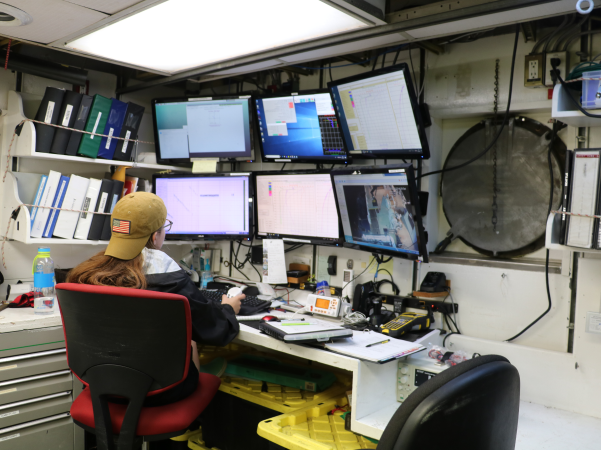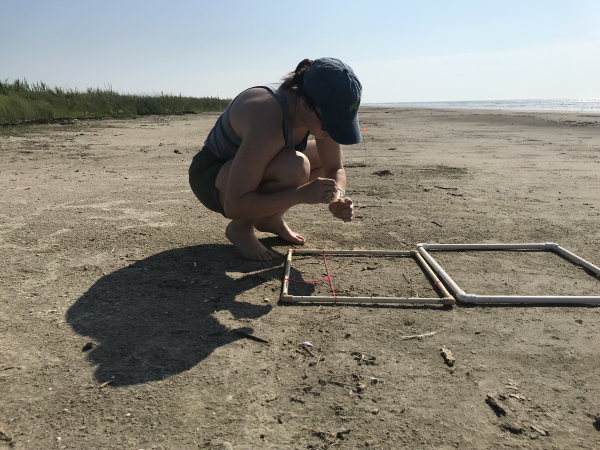Charlotte Miller
Undergraduate Student Spotlight


Charlotte Miller, working at the CTD console on the R/V Point Sur in Summer 2019 (Photo courtesy of Charlotte Miller.)
Name: Charlotte Miller
OCNG track: Marine Ecosystem Science and Health (MESH), Class of 2020
Briefly introduce yourself.
I am from the tiny town of Goshen in the northwest corner of Connecticut, but I also spent part of my life growing up in Queensland, Australia. Outside of academics, I am a Navy contract and a member of the Corps of Cadets where I am currently serving as the commanding officer of Company G-2. I don’t have a ton of very interesting hobbies because I am so busy but when I have free time, I enjoy reading, watching movies, working out, and taking care of my pet Axolotl and Shrek. I also love being outdoors – hiking, fishing, or swimming whenever I get the chance!
What drew you to Texas A&M Oceanography?
I have been passionate about the ocean since I was very little spending time around the Great Barrier Reef, so I knew it was something I wanted to build a career around. I originally came to Texas A&M University as an Ocean Engineering major because oceanography major was not offered to undergraduates yet and I thought that engineering would be best for my Navy career. In my sophomore year, I realized I had no passion for engineering and it was beginning to take a toll on me. Just as I was beginning to feel hopeless, I found out that oceanography was going to be offered to undergraduates. I have had to take very heavy course loads and summer classes to make it work but it was really been so worth it to pursue my passion.
What skills or experiences have you gained through the oceanography undergraduate degree?
Honestly, I have really just learned a lot about being a good scientist. I have learned it was all about continually asking questions and loving your data. Also, the Oceanography department has taught me the importance of proper science communication skills. You cannot expect to change people’s minds about important environmental issues if you cannot properly communicate your findings in a relatable and tangible manner.
What has been your favorite class in the Oceanography Department, and why?
It is hard to choose, but so far, I would say my favorite class has been Hydrothermal Vents and Mid-Ocean Ridges (OCNG 453). The content was amazing and incredibly multidisciplinary, involving different physical, geological, chemical, and biological aspects. Also, the lecturers were both very passionate and knowledgeable about every topic, which made it a really fun class to go to.

Charlotte Miller, collecting microplastics at Sea Rim State Park during undergraduate research program at the Wicksten Lab. (Photo courtesy of Charlotte Miller.)
Tell us about any research or other high-impact opportunities you have involved in.
I worked for two semesters with graduate student, Maureen Hayden, as an undergraduate research assistant in the Wicksten Marine Invertebrate Lab in the Biology department at Texas A&M. We have been examining the effects of microplastic pollution on Talitrid Amphipod populations across different beaches on the Texas Gulf Coast. I also volunteered to work with Dr. Pamela Plotkin and Dr. Christine Figgener in the Plotkin lab, where I helped study sea turtles in Matagorda Bay. Finally, last summer I participated in the Schade Cruise on the RV Point Sur with Dr. Chrissy Wiederwohl and Dr. Shari Yvon-Lewis, where I was the CTD console operator. The experience I learned on that cruise is invaluable, and I also made some amazing friends. I will never forget it.
What are your goals after graduating?
Upon graduation, I will be commissioning into the U.S. Navy as a surface warfare officer, which means I will be serving onboard naval vessels. I will be taking a few years to get all my qualifications as a surface warfare officer and then the Navy will send me to graduate school to study meteorology and oceanography. When I graduate, I will become a METOC (Meteorology and Oceanography) officer on board an aircraft carrier or amphibious ship. Hopefully, someday I will be able to conduct research at the Naval Observatory or Naval Research Labs.
What’s one specific piece of advice you might give to future Texas A&M Oceanography students?
It sounds cheesy, but don’t be afraid to make friends. The close-knit community and the people are really what makes our department so awesome. Getting to know different people will open up amazing opportunities as well as help boost your GPA - having strong study groups are essential!
